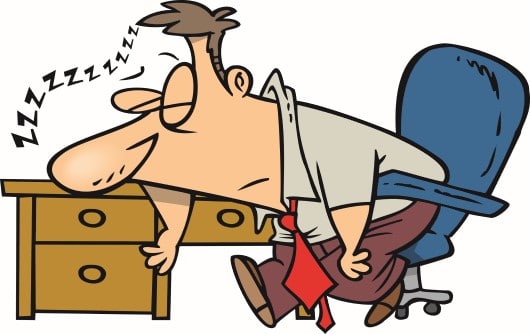
9 Things you can try to treat sleep apnea yourself and why it’s still worth seeing a doctor
By Jason Wooden, PhD | December 31, 2020
The things you can do to treat sleep apnea on your own include lifestyle changes, sleep hygiene, weightloss, exercise, dietary changes, and various other home remedies.
Depending on how severe your symptoms are, it’s still worth seeing a doctor since other underlying health issues could be involved and they’re serious risks if your sleep apnea is not under control.
In this article, we’ll talk about:
Should you treat sleep apnea yourself?
To treat or not to treat sleep apnea yourself…now that is the question.
It’s something many people wonder about when they first suspect they have it.
Sleep apnea is a life-changing ailment that affects millions of people in the US and nearly a billion worldwide.
It can make for miserable nights and even more miserable days.
It’s understandable why you might want to deal with it on your own.
Maybe you have poor insurance coverage, you’re between jobs, or you just want to avoid the hassle of seeing a doctor…
Besides ruining your nights and days, sleep apnea is a serious condition with major downsides if it goes untreated. So, you really have to do something.
Should you treat it on your own?
That likely depends on a variety of factors, including how serious your symptoms are and your overall health status. If your symptoms are mild, perhaps it’s worth a try to see if some simple lifestyle changes can make a difference.
Do you know your sleep apnea symptoms?
- Pauses in breathing
- Choking, gasping, or snorting
- Loud snoring (not all who snore have sleep apnea)
- Dry mouth or sore throat
- Difficulty staying asleep
- Waking up frequently to urinate
- Morning headaches
- Fatigue during the day
- Excessive daytime sleepiness
- Irritability or mood swings
- Attention, memory, or learning problems
Source: American Academy of Sleep Medicine
If things have gotten pretty serious and you’re dealing with other major health issues, you could be playing with fire. The stakes may be way higher than you realize since untreated sleep apnea can lead to complications that kill you.
If this is the case, you need the big guns sooner rather than later.
Regardless, let’s take a look what you can try to treat sleep apnea yourself and the reasons why it’s still a good idea to see a doctor.
What you can do to treat sleep apnea yourself
Okay, before we get into your options for sleep apnea self-treatment, there are a few things you should know.
First, there are two major types of sleep apnea, obstructive and central sleep apnea:
Obstructive sleep apnea, the more common type, happens when the muscles in the throat relax too much during sleep. The airway gets too narrow which interrupts breathing and causes loud snoring.
Central sleep apnea is a communication problem. It happens because the brain is not sending the right signals to the muscles that control breathing. These people seldom snore.
Many of the things you’ll find listed below are geared towards people with obstructive sleep apnea since it’s the most common type.
(You can learn more about your treatment options for central sleep apnea here.)
Some are pretty simple and quick to get going on, others will take time to bear fruit.
Many of the listed options can help with sleep apnea directly AND support healthy sleep.
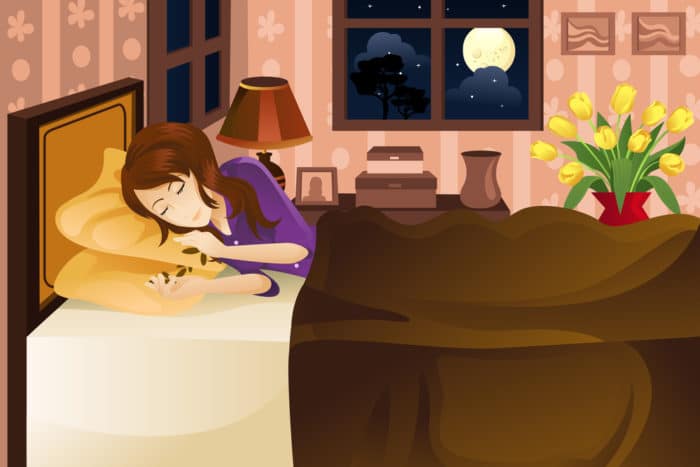
1) Sleep hygiene
Why is this on the list first? That’s because it’s the foundation for good sleep. There’s so many different things that affect how you sleep.
Your everyday habits can make or break sleep. Also, poor sleep hygiene can sabotage the other things you do to treat your sleep apnea.
For better sleep hygiene, you should:
- Wake up and go to bed at the same time every day
- Exercise
- Avoid large meals, alcohol, and stimulants such as caffeine before bedtime
- Maintain a bedtime routine
- Avoid electronics (TVs, tablets, smartphones) near bedtime
- Keep your bedroom dark, cool, quiet, & relaxing
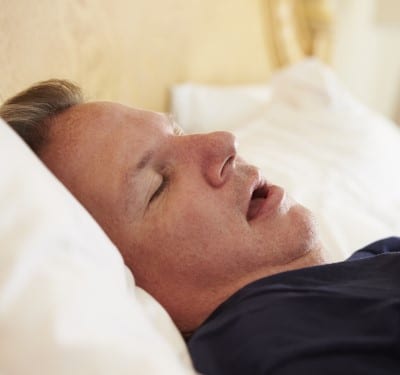
3) Change your sleep position
Did you know that over half of obstructive sleep apnea sufferers have symptoms that are “position-dependent”? Their symptoms are worse if they sleep on their back.
Depending on the severity of your sleep apnea, sleeping on your side instead of your back may help keep your throat more open and improve symptoms. Some people even claim that sleeping upright in a recliner helps.

4) Weight loss
About half of people with sleep apnea are overweight, even a small amount of weight loss can help improve symptoms.
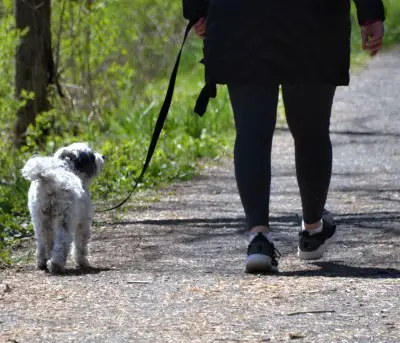
5) Physical activity
Besides helping with weight loss, physical activity is known to promote deeper sleep and there’s evidence it can help reduce sleep apnea breathing disruptions.
So, figure out something that will work for your situation whether it’s swimming, bicycling, jogging, or getting out for a walk. If you’re dealing with other health issues, be sure to check with a doctor so you don’t overexert yourself.

6) Dietary changes
Eating healthier can help with weight loss and keep you from eating foods in the evening that may come back to wreck your sleep.
A low carb anti-inflammatory diet may also help since sleep apnea has been connected to inflammation. (Patients with obstructive sleep apnea, the most common sleep apnea type, have upper airway and systemic inflammation.)
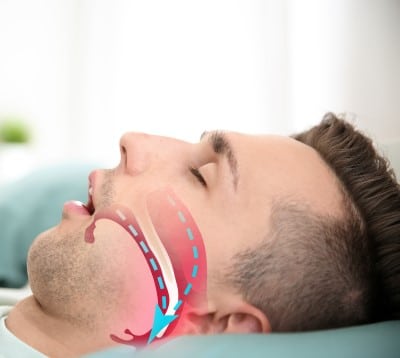
7) Mouthpieces
Oral appliances are used to reposition the lower jaw and tongue so that the airway stays more open. They may work best for mild cases of sleep apnea.
You can find off the shelf anti-snoring mouthpieces online that work by repositioning the mouth. The idea is that if it can help with the snoring, it may also help with sleep apnea.
While this may be a poor man’s substitute for getting an oral appliance professionally fitted by a dental sleep specialist, it may help in some cases as a temporary remedy.

8) Mouth and throat exercises
Various exercises using your mouth and throat may help strengthen your airway and surrounding muscles. This can help the airway stay more open and improve sleep apnea symptoms.
Learn more:
Mouth And Throat Exercises to Help Stop Snoring and Improve OSA (sleepfoundation.org)
Video: Throat exercises for snoring and sleep apnea

9) Online testing and treatment
CPAP is one of the most effective treatments for sleep apnea. Unfortunately, it may not be an option if you’re strapped for cash and lack health insurance.
There’s the cost of an overnight sleep study, diagnosis by a board certified sleep physician, and getting a CPAP setup.
Did you know there are now one stop shopping online sleep apnea companies where you can get diagnosed and treated at a more affordable out-of-pocket cost? They will send a home test kit, review the results, and write you a prescription so you can purchase a CPAP setup online.
Why you should see a doctor even if you treat sleep apnea yourself
Okay, we’ve talked about what you can do on your own to treat your sleep apnea. Like anything in life, there are upsides and downsides if you choose to do this.
The obvious upside is saving money and avoiding hassle.
So, why would you still want to see a doctor?
If you’re symptoms are serious and ongoing, that’s a good reason to get help, especially if it’s really affecting your life. As I mentioned earlier, this is a situation where you need the big guns sooner rather than later.
Also, most people aren’t aware how many health issues are linked to poor sleep. There could be other things going on besides sleep apnea wrecking your nights.
Did you know that arthritis, asthma, chronic pain, cancer, diabetes, and heart disease can cause sleep issues? Anxiety and depression are also linked to poor sleep.
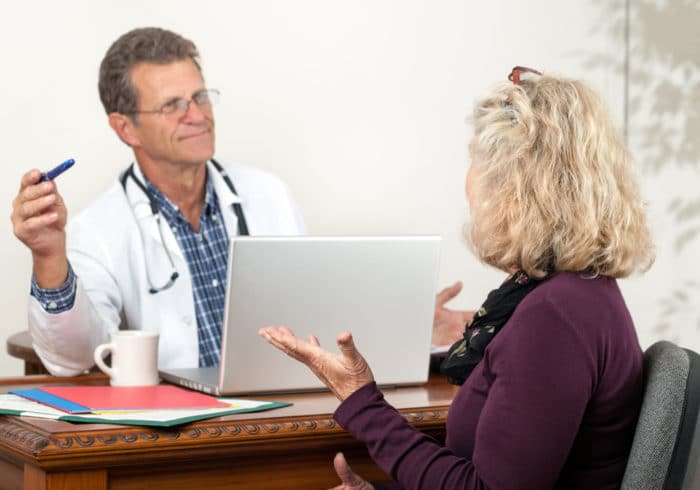
And then there’s the serious health effects of untreated sleep apnea. It has been linked to high blood pressure, heart disease, stroke, diabetes, and depression.
Many of these health issues can eventually result in death if they worsen. That’s why you may be playing with fire if your sleep apnea is not properly treated.
Also, it’s a miserable way to live and you owe it to yourself get relief sooner rather than later.
A doctor can check for other underlying health issues, other sleep apnea risk factors, and make sure you’re doing the right things to get your sleep apnea under control.
Sources:
1. “Sleep Apnea Information for Clinicians”, American Sleep Apnea Association website
2. Estimation of the global prevalence and burden of obstructive sleep apnoea: a literature-based analysis, Lancet Respir Med. 2019 Aug; 7(8): 687–698.
3. “Yes, you can die from sleep apnea. Carrie fisher did.”, 2017, American Sleep Apnea Association website
4. “Alcohol and sleep”, SleepFoundation.org
5. “How smoking affects sleep apnea and CPAP use”, 2019, VitalAire website
Connect with us:
About Us
Better Sleep Simplified® was founded as a place for you to get clear and well-researched information.
Our goal is to make sure you know about your options so that you take action sooner rather than later.
Check us out on YouTube:
Watch and Learn
Helpful sleep tips, interesting sleep facts and statistics you want to know about
Affiliate Disclosure
This site is a participant in the Amazon Services LLC Associates Program and other affiliate advertising programs designed to provide a means for sites to earn advertising fees by advertising and linking to them.
Important: BetterSleepSimplified.com is for informational purposes only and is not intended or implied to be a substitute for professional medical advice, diagnosis, or treatment. Always consult a physician for sleep and health concerns. See additional information.

